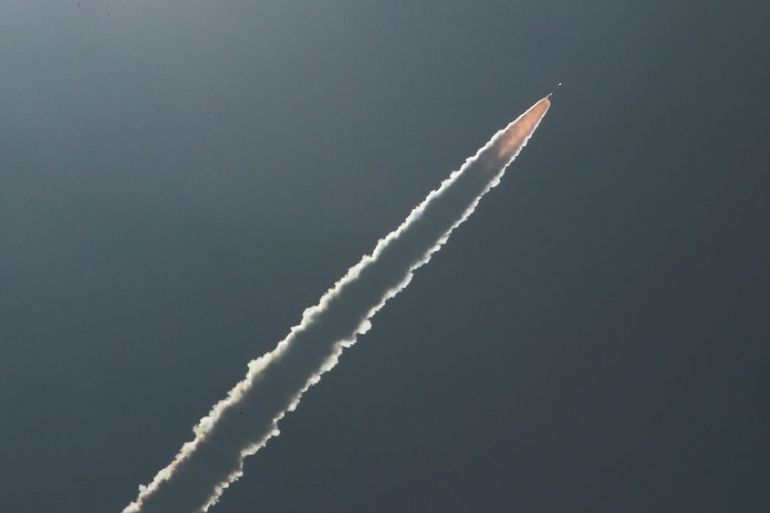Pakistan expresses ‘grave concern’ over Indian space weapons test
Country echoes concerns of NASA that debris from test could damage the International Space Station.

Islamabad, Pakistan – Pakistan has expressed “grave concern” over India’s test last week of an anti-satellite weapon and its potential impact on existing space installations such as the International Space Station (ISS), according to a foreign ministry statement.
On March 27, India announced it had successfully undertaken an anti-satellite (ASAT) missile test, destroying one of its own satellites in low-orbit around Earth using a modified ballistic missile.
Keep reading
list of 4 itemsPalestinian life under Israeli occupation: An illustrated guideThis article will be opened in a new browser window
Boeing’s jets turn 70: A timeline of highs, lows and turbulence
US university ties to weapons contractors under scrutiny amid war in Gaza
“This [anti-satellite weapon] test should be a matter of grave concern for the international community, not only in terms of generation of space debris but also because of its ramifications for long-term sustainability of peaceful space activities,” the Pakistani foreign ministry statement released on Tuesday said.
Indian Prime Minister Narendra Modi, who heads into a general election later this month, hailed the test as a sign of India’s arrival as a “space power”.
#MissionShakti is special for 2 reasons:
(1) India is only the 4th country to acquire such a specialised & modern capability.
(2) Entire effort is indigenous.
India stands tall as a space power!
It will make India stronger, even more secure and will further peace and harmony.— Narendra Modi (@narendramodi) March 27, 2019
On Monday, however, the administrator for US space agency NASA, Jim Bridenstine, said the test created 400 pieces of orbital debris that could damage the ISS and other satellites.
“That is a terrible, terrible thing to create an event that sends debris in an apogee that goes above the International Space Station,” Bridenstine said at a town hall event, referring to the highest point the debris reached in orbit.
“And that kind of activity is not compatible with the future of human space flight that we need to see happen.”
NASA has calculated that the debris from India’s ASAT test has increased the probability of debris hitting the ISS by at least 44 percent over 10 days, with 24 of the 60 pieces it is tracking currently travelling above the apogee of the ISS.
India says the debris is harmless and will not affect any other satellites or the ISS.
“The test was done in the lower atmosphere to ensure that there is no space debris,” said an Indian foreign ministry statement. “Whatever debris that is generated will decay and fall back onto the earth within weeks.”
‘No intention of entering arms race’
Pakistan said India’s test was detrimental to the cause of space remaining peaceful.
“Pakistan remains a strong proponent of non-militarisation of outer space,” its statement said. “We will continue to work with like-minded countries to address gaps in the international legal regime governing the exploration and use of outer space with a view to ensuring that no one threatens peaceful activities and applications of space technologies for socio-economic development.”
Currently, there are no binding international agreements on the use of weapons in space. The 1967 Outer Space Treaty, to which India and Pakistan are signatories, prohibits the use of weapons of mass destruction in space but does not restrict the use of conventional weapons.
India’s government, meanwhile, hailed the test as a proclamation of the country’s scientific and military prowess. So far, the US, Russia and China are the only other countries to conduct ASAT missile tests successfully.
“India stands tall as a space power! It will make India stronger, even more secure and will further peace and harmony,” Modi tweeted shortly after the test.
An Indian foreign ministry statement said the test was “not directed against any country”.
“India has no intention of entering into an arms race in outer space,” said the statement. “We have always maintained that space must be used only for peaceful purposes.”
Shortly after the test, however, Indian PM Modi tweeted: “Our scientists have given India the capability to smash those forces who threaten our peace and harmony.”
Indeed, a proud moment for the whole nation.
Just like you smash the bad deliveries out of the park, our scientists have given India the capability to smash those forces who threaten our peace and harmony. #MissionShakti https://t.co/U4mpQiH9Fn
— Narendra Modi (@narendramodi) March 27, 2019
The tweet was a possible allusion to Pakistan, with whom tensions have been high in recent weeks following a suicide attack in the Indian-administered Kashmir town of Pulwama in February.
India responded to the suicide attack, which its military and political leadership blamed on Pakistan, by launching airstrikes on Pakistani territory. Pakistan responded with airstrikes of its own, with both country’s fighter jets engaged in an aerial dogfight that resulted in at least one Indian Air Force jet shot down on February 27.
Tensions remain high with frequent shelling across the Line of Control – the de facto border – that separates Indian and Pakistan-administered Kashmir. On Tuesday, at least three Pakistani soldiers were killed in shelling in the disputed territory.
Asad Hashim is Al Jazeera’s digital correspondent in Pakistan. He tweets @AsadHashim.